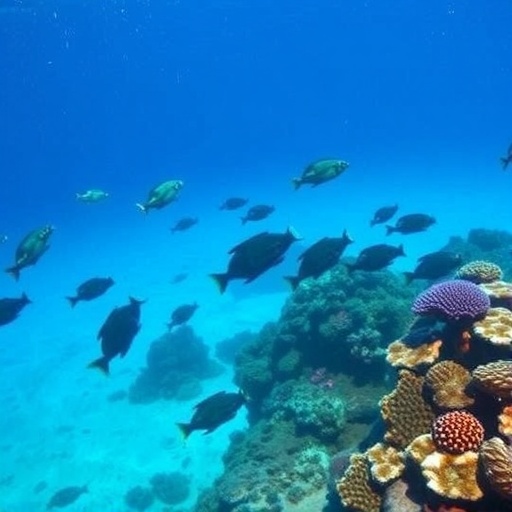The symbiotic relationship between coral larvae and the dinoflagellates known as Symbiodiniaceae is crucial for the health and longevity of coral ecosystems. Recent research has illuminated the urgent threats posed to this symbiotic interaction by the specter of climate change. This timely investigation, led by researchers including Loures, Rädecker, and Voolstra, meticulously explores how rising temperatures, ocean acidification, and other climate-related phenomena jeopardize coral reproductive patterns, dispersal mechanisms, and overall recruitment rates.
Coral reefs, among the most biodiverse ecosystems on Earth, rely profoundly on their symbiotic partnerships with Symbiodiniaceae. These microscopic algae provide corals with essential nutrients through photosynthesis, a relationship that allows corals to thrive in nutrient-poor waters. However, as global temperatures continue to rise, many coral species are finding it increasingly difficult to maintain these vital associations. The researchers argue that changes in environmental conditions can disrupt the delicate balance of this relationship, resulting in reduced reproductive success for corals and subsequently lower recruitment rates for new coral colonies.
One of the most concerning findings from the study is the impact of elevated sea temperatures on the larvae of coral. As temperatures increase, the metabolic rates of larvae spike, leading to potential mismatches between the timing of coral reproduction and the availability of environmental conditions conducive to successful larval dispersal. Warmer waters could push coral spawning events earlier in the year, significantly complicating the synchronized reproductive patterns necessary for effective fertilization. Consequently, varying reproductive timing may lead to reduced genetic diversity within coral populations, further exacerbating their vulnerability.
In addition to temperature fluctuations, researchers emphasize that the increasing acidification of oceans poses a dire threat to the physiological processes of both corals and their symbiotic partners. The carbon dioxide (CO2) absorption by the ocean leads to a lowered pH, which negatively affects the ability of corals to calcify—a process essential for their structural integrity and growth. This acidification can also impact the photosynthetic efficiency of Symbiodiniaceae, thereby reducing the energy supply to the coral host and weakening the entire coral reef structure.
The interplay of factors resulting from climate change complicates recruitment dynamics for coral larvae. In tropical waters, favorable conditions for larval settlement, such as suitable substrate availability and the presence of established coral communities, are rapidly dwindling. The study outlines how an increase in sea surface temperatures and a decrease in water quality can deter larval settlement, making it difficult for coral ecosystems to replenish themselves naturally. This creates a cascading effect whereby an insufficient recruitment may hinder reef recovery and resilience following disturbances like bleaching events.
The researchers did not shy away from discussing the broader implications of declining coral populations. Coral reefs support over a billion people worldwide, offering food security, coastal protection, and economic opportunities linked to tourism and fisheries. The reproductive challenges presented by climate change could therefore reverberate through local economies that depend on the ecological services provided by healthy coral reefs. The loss of coral reefs could lead to significant declines in fish populations reliant on these habitats, further threatening the livelihoods of communities around the globe.
Effective management strategies are essential to mitigate these impacts, according to the study. The urgent need for integrated approaches that combine climate adaptation strategies with conservation efforts is at the forefront of the researchers’ recommendations. Preserving genetic diversity within coral populations can enhance resilience to environmental stressors. Establishing marine protected areas could also play a significant role in safeguarding crucial habitats where corals can thrive and adapt.
Moreover, the researchers urge policymakers and stakeholders to take serious steps towards carbon emission reductions. Immediate and sustained efforts to combat climate change could alleviate some of the pressures facing these ecosystems. Global initiatives to reduce greenhouse gas emissions, coupled with heightened awareness and education about the importance of coral reefs, can foster more sustainable interactions between human activities and marine ecosystems.
As the research unfolds, it becomes increasingly clear that the intricate relationship between coral larvae and Symbiodiniaceae is under unprecedented pressure from climate change. The insights provided in this study serve as a critical alarm bell, underscoring the need for immediate action to safeguard these vital ecosystems. Without dedication and a cohesive approach towards addressing these challenges, the future of coral reefs may be uncertain, leading to irreversible losses in biodiversity and ecological function.
In conclusion, the study conducted by Loures, Rädecker, and Voolstra highlights the immediate need for a concerted response to protect coral larvae and their essential partnerships with Symbiodiniaceae. As coral reefs face mounting pressures from climate change, understanding and mitigating the impacts on their reproductive, dispersal, and recruitment processes becomes existential to their survival. The resilience of these ecosystems hangs in the balance, underscoring the importance of immediate global efforts toward conservation and climate action.
The scientific community must continue to engage in research that builds upon these findings, aiming to unravel the complexity surrounding coral symbiosis and its vulnerabilities. Comprehensive studies that explore adaptive capacity, resilience, and innovative management solutions will be vital to ensuring that coral reefs endure as vital, living ecosystems for generations to come.
Subject of Research: Climate change impacts on the larva-Symbiodiniaceae association in coral reefs.
Article Title: The larva-Symbiodiniaceae association at risk: putative impacts of climate change on reproduction, dispersal, and recruitment in coral reefs.
Article References:
Loures, A., Rädecker, N., Voolstra, C.R. et al. The larva-Symbiodiniaceae association at risk: putative impacts of climate change on reproduction, dispersal, and recruitment in coral reefs.
Coral Reefs (2025). https://doi.org/10.1007/s00338-025-02777-9
Image Credits: AI Generated
DOI: https://doi.org/10.1007/s00338-025-02777-9
Keywords: Coral larvae, Symbiodiniaceae, climate change, coral reefs, reproductive success, dispersal, recruitment.




